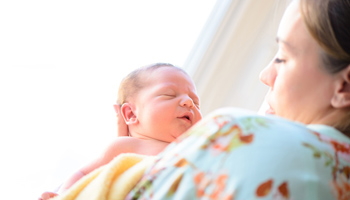HOW CAN WE HELP YOU? Call 1-800-TRY-CHOP
In This Section
Is Mindfulness Important for Mothers of Babies With Heart Conditions?

The findings:
A cardiac intensive care unit (CICU) filled with tiny infants connected to collections of tubes and buzzing monitors can be an intimidating and overwhelming place for a mother who is worried about her newborn with congenital heart disease (CHD). A Children’s Hospital of Philadelphia team of nurse researchers conducted a qualitative study in which mothers of babies who have a complex heart condition described the post-diagnostic period, surgery, and the CICU stay as extremely stressful. The researchers also examined mothers’ coping mechanisms, and they identified mindfulness as a potential helpful early intervention tool to reduce mothers’ stress.
Why it matters:
The coping mechanisms of mothers of infants with CHD could influence how a family adapts to their infants’ complex medical needs and also impact the infants’ outcomes. Nurse researchers want to find out how they can best address these mothers’ anxiety. Currently, no data-based strategies have been developed to assist mothers of critically ill infants with CHD in developing skills for stress reduction, emotion, affect, and attention regulation. The researchers concluded that an acceptable and feasible approach is to encourage mothers to practice mindfulness, which teaches a person to pause, appreciate the present, and engage in a heightened internal awareness without emotional reactivity.
Who conducted the study:
A team of nurse researchers from CHOP and the University Pennsylvania School of Nursing conducted the study led by Barbara Medoff-Cooper, PhD, RN, FAAN, principal investigator and Ruth M. Colket Professor in Pediatric Nursing at CHOP and at a professor at Penn Nursing. Nadya Golfenshtein, PhD, RN, a researcher at Penn Nursing was lead author of the study. Amy Jo Lisanti, PhD, RN, CCNS, CCRN-K, a nurse researcher at CHOP and Penn postdoctoral fellow, also contributed to the study.
How they did it:
The study team gathered perspectives on coping mechanisms from focus groups with 14 mothers of critically ill infants. The researchers collected data during sessions between July 2015 and March 2016. They explored the feasibility of mindfulness as a stress-reduction technique. The sessions included a short introduction to mindfulness led by a moderator who is a psychotherapist experienced in group formats.
Quick thoughts:
“(Mothers’) increased stress often led to them feeling out of control, lethargic, and not like themselves,” Dr. Lisanti said. “They acknowledged the importance of stress reduction, recognizing that relief from stress could help them sleep better, recharge energy, focus, and think clearly.”
What’s next:
The study team wants to do more research on mindfulness in a larger cohort of mothers and design a program that draws from these findings to help mothers engage in mindfulness as a coping strategy with a positive focus on the “here and now.”
Where the study was published:
Where to learn more:
Read a feature story in our online magazine Bench to Bedside about this novel research that centers on how CICU nurses can best help mothers who feel stressed in the CICU. In a previous study, published in the American Journal of Critical Care, Dr. Lisanti identified some of the strongest factors that contribute to such distress.
“Talking with these parents, sensing their stress, and seeing that they wanted to discuss their anxiety in developmental rounds, it was clear,” Dr. Lisanti said in the Bench to Bedside article. “We really need to come up with ways to understand what is feeding into parents’ stress so we as nurses can do something about it.”
Find out more about the Journal of Pediatric Nursing study in this press release.


